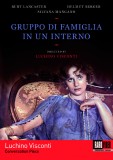| Reviews & Columns |
|
Reviews DVD TV on DVD Blu-ray 4K UHD International DVDs In Theaters Reviews by Studio Video Games Features Collector Series DVDs Easter Egg Database Interviews DVD Talk Radio Feature Articles Columns Anime Talk DVD Savant Horror DVDs The M.O.D. Squad Art House HD Talk Silent DVD
|
DVD Talk Forum |
|
|
| Resources |
|
DVD Price Search Customer Service #'s RCE Info Links |
|
Columns
|
|
|
Conversation Piece (Gruppo di famiglia in un interno)
THE MOVIE:
"I'm not interested in people who lose control of their own destiny."
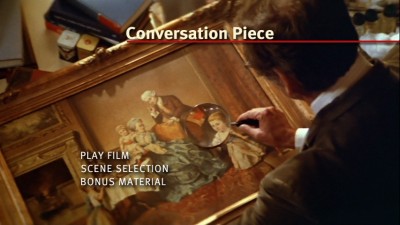
Luchino Visconti's second-to-last picture, Conversation Piece (original title: Gruppo di famiglia in un interno) is a contemplative chamber drama. Released in 1974, it is perhaps the great Italian director's most modern effort, reflecting an old man's acceptance of the changes happening in the world around him while also establishing at least some sort of defense of all the things that came before. In his way, this is Visconti meeting the new generation halfway, simultaneously sharing the ways of old with them while taking a glimpse at what they have to offer. In between, he finds some unexpected commonalities.
Burt Lancaster, who played a similar role in the director's masterful The Leopard, returns to Italy to play "Il Professore," an American scholar who has made his home in a large house in Rome. For years, he has lived alone with his books and paintings, enjoying the solitude of memory and the invented lives of the people depicted in the portraits that fill his walls. His preferred medium is the "conversation piece," an 18th-century style of painting that shows families together, most often in natural environments.
Things change dramatically for the Professor when the Marchesa Bianca Brumonti (Silvana Mangano, Ludwig, Dune) forces her way into his life. She has learned that he has a disused upstairs apartment, and she wants to rent it for her lover, a young German hothead named Konrad (Helmut Berger, The Romantic Englishwoman). In addition to inheriting this hustler, the Professor's life is also disrupted by the Marchcesa's daughter, Lietta (Claudia Marsani), and her boyfriend, Stefano (Stefano Patrizi). The new arrangement goes wrong rather quickly when Konrad decides to remodel the place with a sledge hammer, but before long, the Professor begins to accept the young people--and all their disruptions--into his life. The change is largely caused by his discovery that Konrad is not entirely as he seems to be. Though a gigolo now, he was once a political activist and knows a thing or two about painting and music. The Professor, in a way, comes to view him as a son. The old man also comes out of the shell he crawled into after suffering personal loss. We get brief glimpses of his sad past in flashback, though we never learn what really happened. (In these scenes, his wife is played by Claudia Cardinale and his mother by Dominique Sanda.)
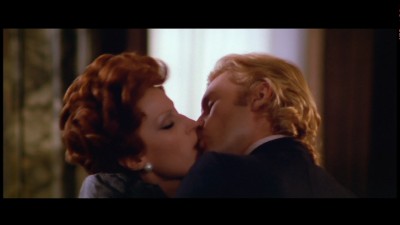
Luchino Visconti was part of the post-War Neorealist movement, but is unique amongst his peers for being from an aristocratic family and thus being more concerned with the upper classes. In films like Senso and his segment of Boccaccio '70, he explored the clash of old-fashioned social mores and modernity, as well as exposing the truth behind his subjects' public façade. In short, the rich have the same pettiness and heartbreak as anyone else, regardless of how ornate their outward disguise.
These same concerns inform the script for Conversation Piece, and the more secrets that are exposed, the more the social niceties break down in the Professor's house. The Marchesa has her own reasons for paying for love, and Konrad has his for taking the payment--just as the Professor has his reasons for hiding from the rest of the world. He has accepted his lot in life, as well as the fact that his time is soon going to pass. The Professor is much like the character Lancaster played in The Leopard: his usefulness in a changing culture is also indicative of his own mortality. It's ironic that he would be reawakened at so late an hour. He grows closest to the three young people, even if it's too little too late. Unsurprisingly, Lancaster is quite good as the elder statesman, maintaining a kind of stoic grandeur that is slowly chipped away, leaving him vulnerable. Helmut Berger is also excellent as the would-be con man. His foul-mouthed demeanor gives way to a startling sensitivity. Both actors begin on opposite sides of the emotional spectrum, but both are guarded. The more they drop their defenses, the more human their portrayals become.
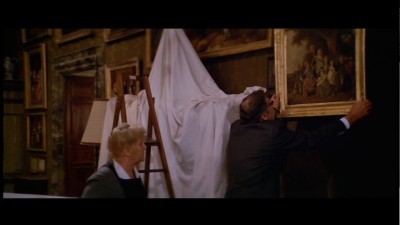
All of the scenes in Conversation Piece occur inside the Professor's spacious home. The film, however, is neither static nor confined. Long hallways and high ceilings give the characters plenty of room to roam, and the copious decorations fill the frame so there is always plenty to look at. The still images on the paintings are meant to represent an arrested existence, though Konrad's approval of the Professor's aesthetic choices give him some validation. (Indeed, Lietta and Stefano sway the old man by meeting him on his own terms, buying him a new family painting for his wall, a symbolic giving of "themselves.") Visconti and his regular cinematographer, Pasqualino De Santis, relish in the details. The full spaciousness of the interiors are given emphasis when it is suitable to show how lost the players are within this invented scene. Likewise, they play with a sort of upstairs/downstairs metaphor (young above, old buried below), as the top apartment is demolished and rebuilt as a modern-art experiment. The primary colors give it an expansive feel that shows just how cramped and overstuffed the Professor's life has become.
Of course, as more truths are revealed, things grow more and more complicated for this makeshift clan. Despite first and even second impressions, there is more to each story than is immediately evident. Much comes to light at a dinner that was originally meant to reestablish peace amongst everyone after Konrad's latest attempt to escape the Marchesa nearly landed him in jail. Words are exchanged, both good and bad, and for some they are words that can't be taken back. The Professor also tells an old story about how death can arrive unannounced and in disguise, a truth he has always feared but one that his new friends have convinced him to no longer concern himself with. Thus, in its final scenes, Conversation Piece becomes a cautionary tale, warning against waiting too long to engage in life and embrace the people around you. Unfortunately for some, it is a message that comes too late, and its revelation is bittersweet.
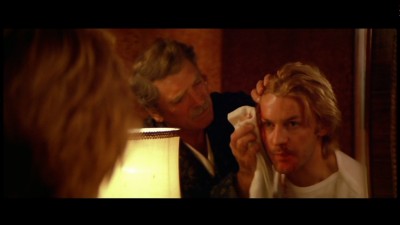
THE DVD
Video:
Raro presents Conversation Piece at a 2.35:1 widescreen aspect ratio. The transfer is excellent, with wonderfully realized colors and a slight grain that maintains the movie's cinematic look. There is occasional softness to the picture, most notable in the corners of the frame in some scenes, but these are minor flaws. The image itself shows no scratches or damage.
Sound:
The original English-language soundtrack is mixed in mono. It is clean, with no evident hiss or hiccups.
Extras:
The original theatrical trailer is here, as is a 9-and-a-half minute interview with critic Alessandro Benccivenni.
An illustrated booklet is included in the case, and it features liner notes by Mark Rappaport and a biography of Visconti.
FINAL THOUGHTS:
Highly Recommended. Conversation Piece, Luchino Visconti's penultimate movie, is a quiet, yet surprisingly warm, portrait of an unforeseen meeting of the generations. Burt Lancaster turns in a marvelous performance as an aging professor whose life is taken over by a pushy countess and her brood moving into the upstairs apartment in his large Roman home. The primary tenant (Helmut Berger) is a sometimes crass, regularly headstrong gigolo who reveals unexpected layers, forming a bond with the old man. A complicated drama, Conversation Piece has plenty to say about cultural change, age, and human connections. It's a grand work from a master cinematic storyteller, an old film that has received new life via a very modern technology.
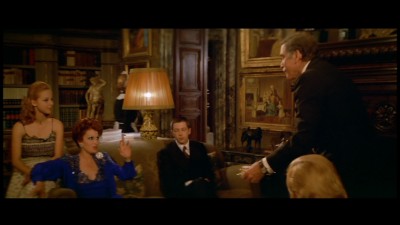
Jamie S. Rich is a novelist and comic book writer. He is best known for his collaborations with Joelle Jones, including the hardboiled crime comic book You Have Killed Me, the challenging romance 12 Reasons Why I Love Her, and the 2007 prose novel Have You Seen the Horizon Lately?, for which Jones did the cover. All three were published by Oni Press. His most recent projects include the futuristic romance A Boy and a Girl with Natalie Nourigat; Archer Coe and the Thousand Natural Shocks, a loopy crime tale drawn by Dan Christensen; and the horror miniseries Madame Frankenstein, a collaboration with Megan Levens. Follow Rich's blog at Confessions123.com.
|
| Popular Reviews |
| Sponsored Links |
|
|
| Sponsored Links |
|
|
| Release List | Reviews | Shop | Newsletter | Forum | DVD Giveaways | Blu-Ray | Advertise |
|
Copyright 2024 DVDTalk.com All Rights Reserved. Legal Info, Privacy Policy, Terms of Use,
Manage Preferences,
Your Privacy Choices | |||||||









